Fair Work Commission and Employment Relations in Australia
VerifiedAdded on 2023/01/16
|7
|2118
|47
Essay
AI Summary
This essay provides a comprehensive analysis of employment relations in Australia, with a particular focus on the role and effectiveness of the Fair Work Commission (FWC). It examines the FWC's responsibilities in maintaining industrial relations, including the administration of modern awards, dispute resolution, and setting minimum wages. The essay highlights the importance of modern awards in ensuring minimum standards for employees, such as minimum wages, working conditions, and leave entitlements. It discusses the relationship between modern awards, the National Employment Standards (NES), and government standards, emphasizing the protections these provide to both employees and employers. The essay also explores the evolution of modern awards, including the introduction of flexibility in work provisions and dispute resolution mechanisms. Furthermore, it addresses the challenges and limitations of the current system, suggesting potential amendments and improvements to enhance the effectiveness of employment relations in Australia. The essay concludes by emphasizing the significance of modern awards in fostering fair and equitable workplaces.
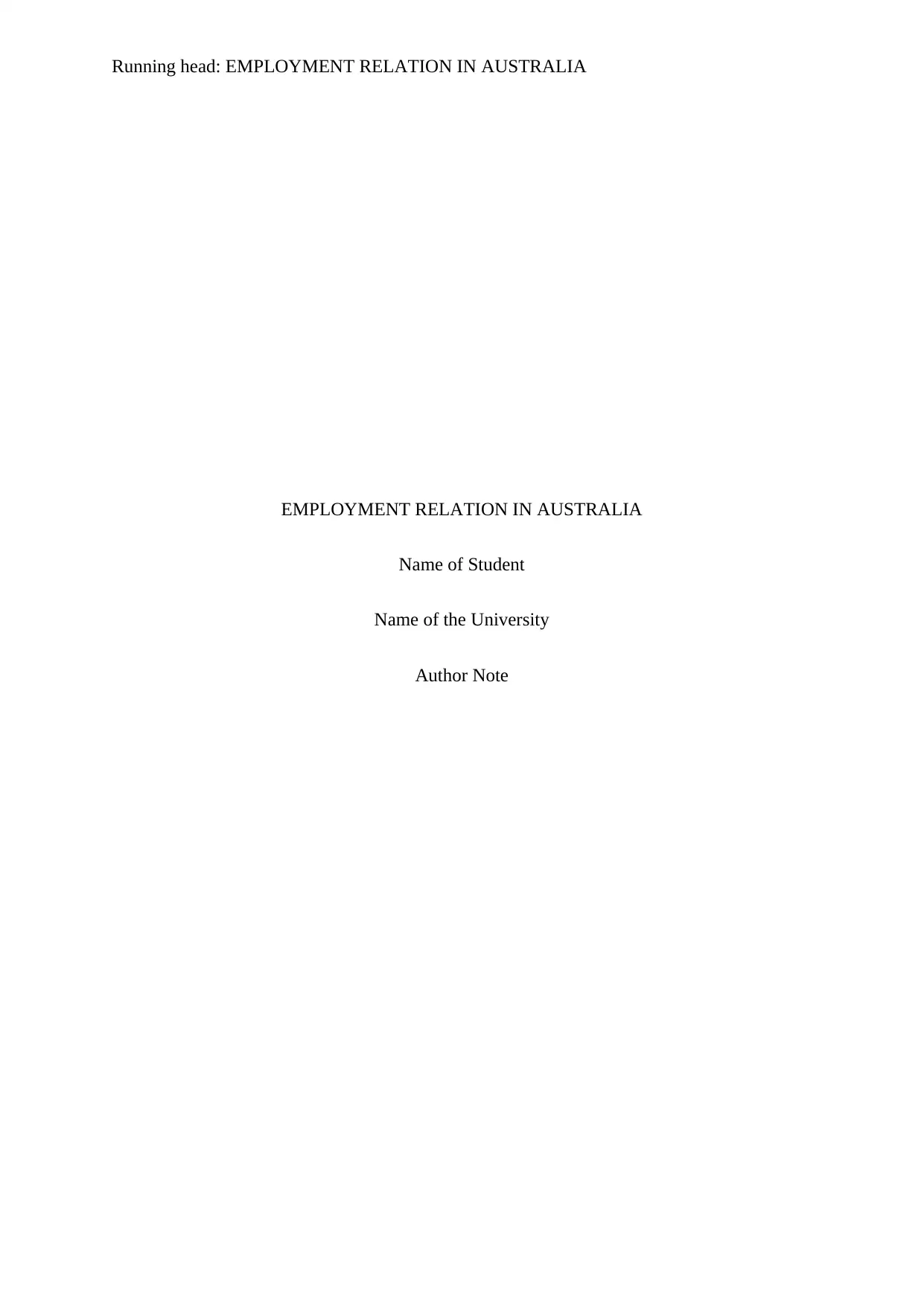
Running head: EMPLOYMENT RELATION IN AUSTRALIA
EMPLOYMENT RELATION IN AUSTRALIA
Name of Student
Name of the University
Author Note
EMPLOYMENT RELATION IN AUSTRALIA
Name of Student
Name of the University
Author Note
Paraphrase This Document
Need a fresh take? Get an instant paraphrase of this document with our AI Paraphraser
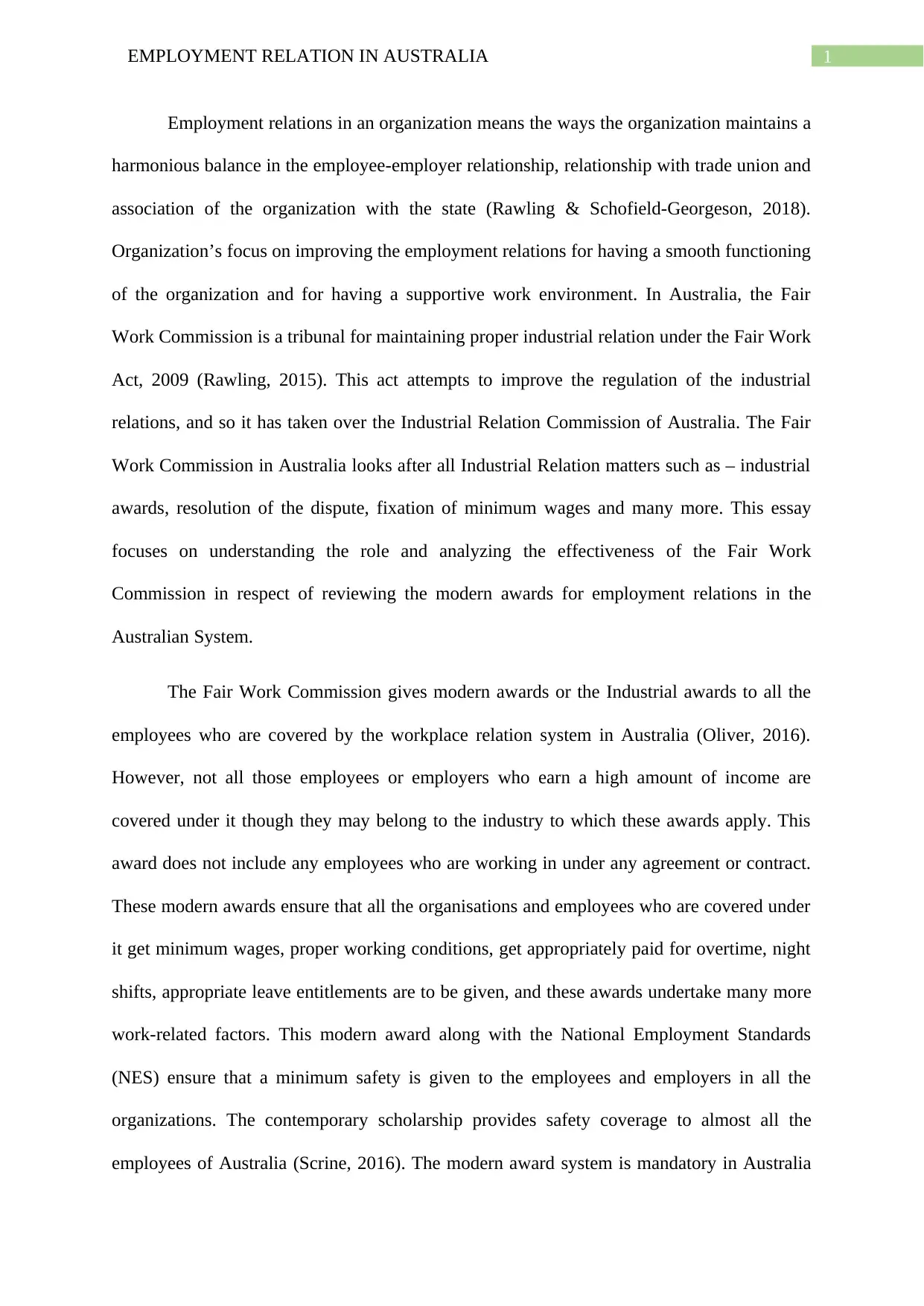
1EMPLOYMENT RELATION IN AUSTRALIA
Employment relations in an organization means the ways the organization maintains a
harmonious balance in the employee-employer relationship, relationship with trade union and
association of the organization with the state (Rawling & Schofield-Georgeson, 2018).
Organization’s focus on improving the employment relations for having a smooth functioning
of the organization and for having a supportive work environment. In Australia, the Fair
Work Commission is a tribunal for maintaining proper industrial relation under the Fair Work
Act, 2009 (Rawling, 2015). This act attempts to improve the regulation of the industrial
relations, and so it has taken over the Industrial Relation Commission of Australia. The Fair
Work Commission in Australia looks after all Industrial Relation matters such as – industrial
awards, resolution of the dispute, fixation of minimum wages and many more. This essay
focuses on understanding the role and analyzing the effectiveness of the Fair Work
Commission in respect of reviewing the modern awards for employment relations in the
Australian System.
The Fair Work Commission gives modern awards or the Industrial awards to all the
employees who are covered by the workplace relation system in Australia (Oliver, 2016).
However, not all those employees or employers who earn a high amount of income are
covered under it though they may belong to the industry to which these awards apply. This
award does not include any employees who are working in under any agreement or contract.
These modern awards ensure that all the organisations and employees who are covered under
it get minimum wages, proper working conditions, get appropriately paid for overtime, night
shifts, appropriate leave entitlements are to be given, and these awards undertake many more
work-related factors. This modern award along with the National Employment Standards
(NES) ensure that a minimum safety is given to the employees and employers in all the
organizations. The contemporary scholarship provides safety coverage to almost all the
employees of Australia (Scrine, 2016). The modern award system is mandatory in Australia
Employment relations in an organization means the ways the organization maintains a
harmonious balance in the employee-employer relationship, relationship with trade union and
association of the organization with the state (Rawling & Schofield-Georgeson, 2018).
Organization’s focus on improving the employment relations for having a smooth functioning
of the organization and for having a supportive work environment. In Australia, the Fair
Work Commission is a tribunal for maintaining proper industrial relation under the Fair Work
Act, 2009 (Rawling, 2015). This act attempts to improve the regulation of the industrial
relations, and so it has taken over the Industrial Relation Commission of Australia. The Fair
Work Commission in Australia looks after all Industrial Relation matters such as – industrial
awards, resolution of the dispute, fixation of minimum wages and many more. This essay
focuses on understanding the role and analyzing the effectiveness of the Fair Work
Commission in respect of reviewing the modern awards for employment relations in the
Australian System.
The Fair Work Commission gives modern awards or the Industrial awards to all the
employees who are covered by the workplace relation system in Australia (Oliver, 2016).
However, not all those employees or employers who earn a high amount of income are
covered under it though they may belong to the industry to which these awards apply. This
award does not include any employees who are working in under any agreement or contract.
These modern awards ensure that all the organisations and employees who are covered under
it get minimum wages, proper working conditions, get appropriately paid for overtime, night
shifts, appropriate leave entitlements are to be given, and these awards undertake many more
work-related factors. This modern award along with the National Employment Standards
(NES) ensure that a minimum safety is given to the employees and employers in all the
organizations. The contemporary scholarship provides safety coverage to almost all the
employees of Australia (Scrine, 2016). The modern award system is mandatory in Australia
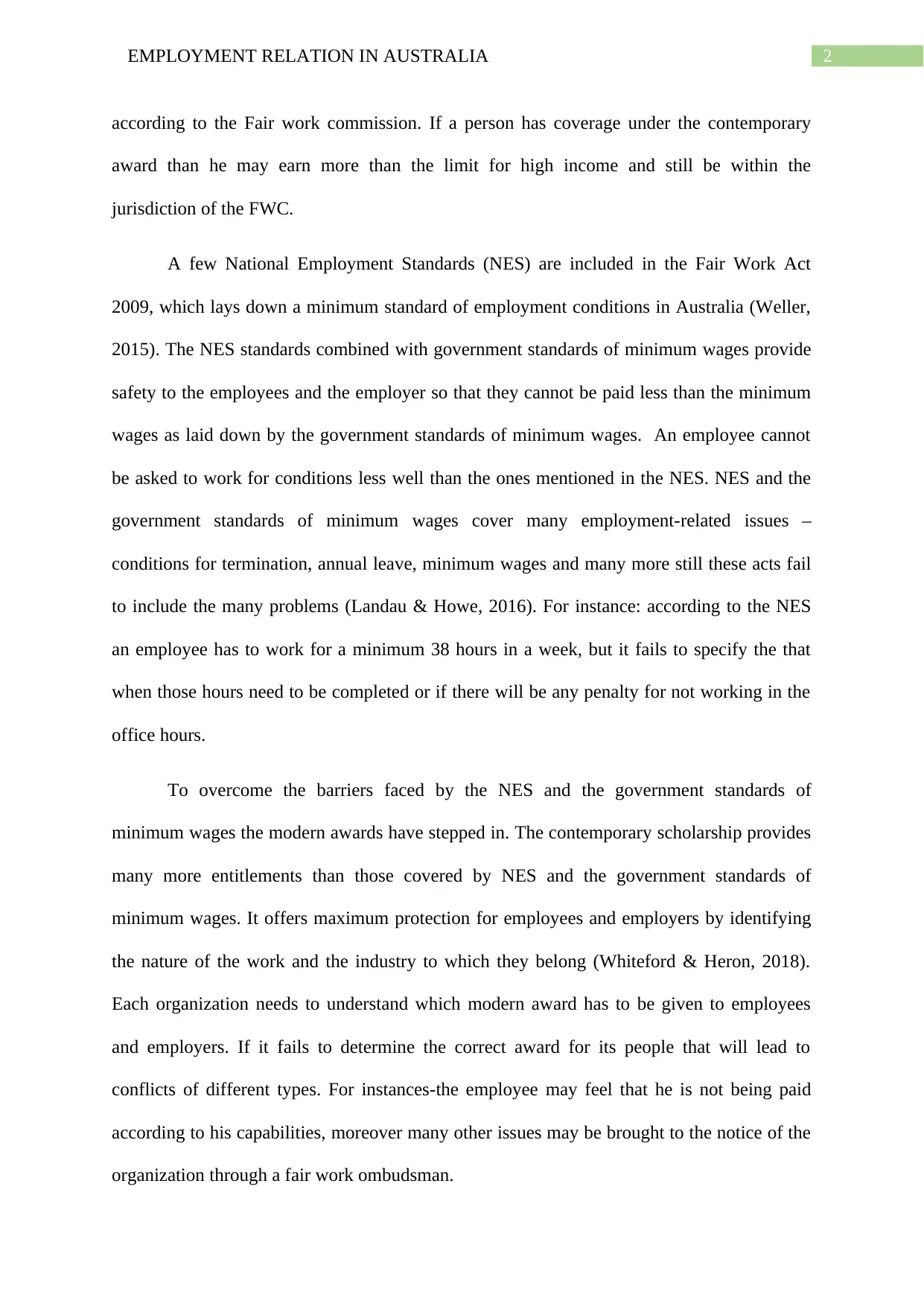
2EMPLOYMENT RELATION IN AUSTRALIA
according to the Fair work commission. If a person has coverage under the contemporary
award than he may earn more than the limit for high income and still be within the
jurisdiction of the FWC.
A few National Employment Standards (NES) are included in the Fair Work Act
2009, which lays down a minimum standard of employment conditions in Australia (Weller,
2015). The NES standards combined with government standards of minimum wages provide
safety to the employees and the employer so that they cannot be paid less than the minimum
wages as laid down by the government standards of minimum wages. An employee cannot
be asked to work for conditions less well than the ones mentioned in the NES. NES and the
government standards of minimum wages cover many employment-related issues –
conditions for termination, annual leave, minimum wages and many more still these acts fail
to include the many problems (Landau & Howe, 2016). For instance: according to the NES
an employee has to work for a minimum 38 hours in a week, but it fails to specify the that
when those hours need to be completed or if there will be any penalty for not working in the
office hours.
To overcome the barriers faced by the NES and the government standards of
minimum wages the modern awards have stepped in. The contemporary scholarship provides
many more entitlements than those covered by NES and the government standards of
minimum wages. It offers maximum protection for employees and employers by identifying
the nature of the work and the industry to which they belong (Whiteford & Heron, 2018).
Each organization needs to understand which modern award has to be given to employees
and employers. If it fails to determine the correct award for its people that will lead to
conflicts of different types. For instances-the employee may feel that he is not being paid
according to his capabilities, moreover many other issues may be brought to the notice of the
organization through a fair work ombudsman.
according to the Fair work commission. If a person has coverage under the contemporary
award than he may earn more than the limit for high income and still be within the
jurisdiction of the FWC.
A few National Employment Standards (NES) are included in the Fair Work Act
2009, which lays down a minimum standard of employment conditions in Australia (Weller,
2015). The NES standards combined with government standards of minimum wages provide
safety to the employees and the employer so that they cannot be paid less than the minimum
wages as laid down by the government standards of minimum wages. An employee cannot
be asked to work for conditions less well than the ones mentioned in the NES. NES and the
government standards of minimum wages cover many employment-related issues –
conditions for termination, annual leave, minimum wages and many more still these acts fail
to include the many problems (Landau & Howe, 2016). For instance: according to the NES
an employee has to work for a minimum 38 hours in a week, but it fails to specify the that
when those hours need to be completed or if there will be any penalty for not working in the
office hours.
To overcome the barriers faced by the NES and the government standards of
minimum wages the modern awards have stepped in. The contemporary scholarship provides
many more entitlements than those covered by NES and the government standards of
minimum wages. It offers maximum protection for employees and employers by identifying
the nature of the work and the industry to which they belong (Whiteford & Heron, 2018).
Each organization needs to understand which modern award has to be given to employees
and employers. If it fails to determine the correct award for its people that will lead to
conflicts of different types. For instances-the employee may feel that he is not being paid
according to his capabilities, moreover many other issues may be brought to the notice of the
organization through a fair work ombudsman.
⊘ This is a preview!⊘
Do you want full access?
Subscribe today to unlock all pages.

Trusted by 1+ million students worldwide
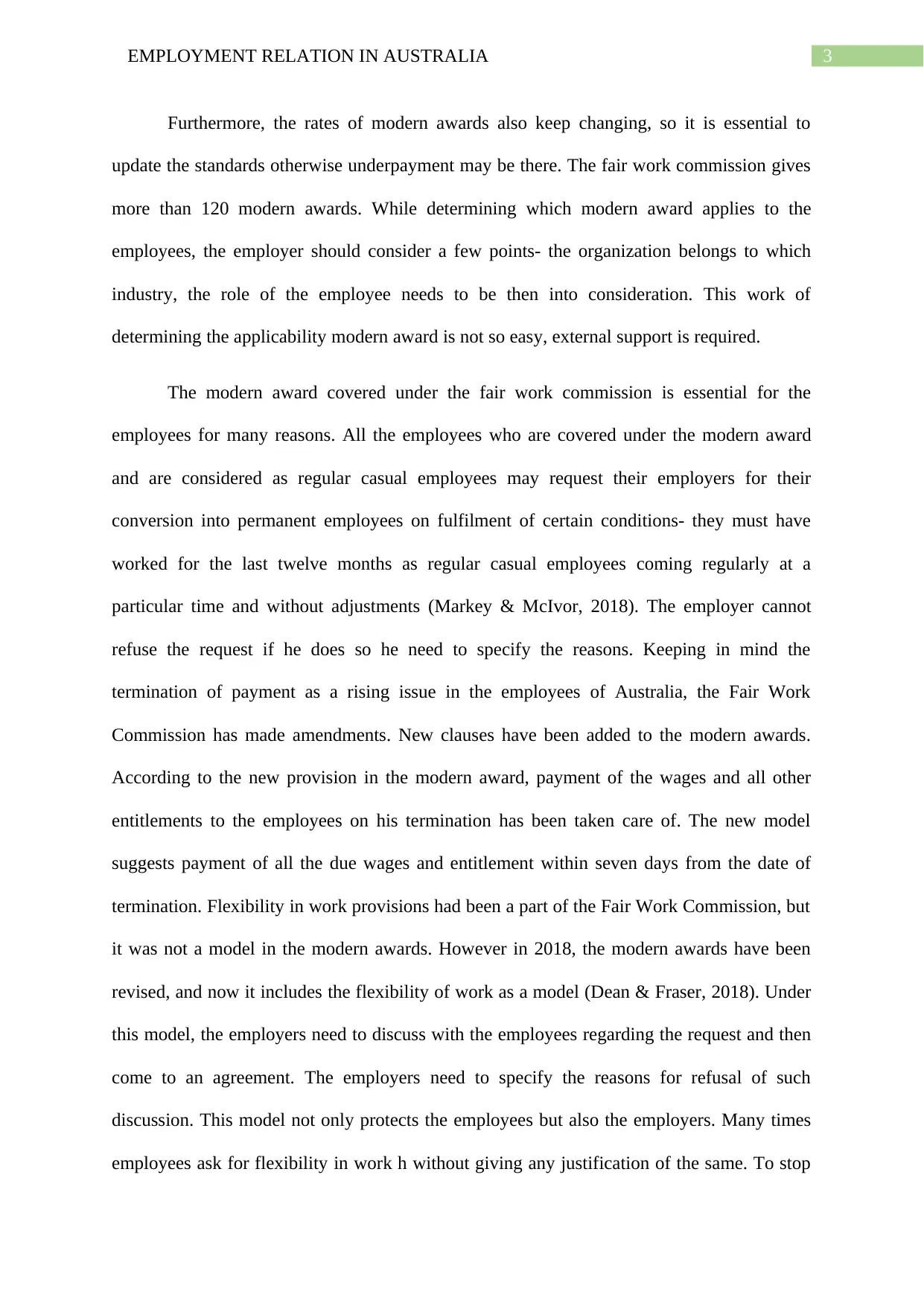
3EMPLOYMENT RELATION IN AUSTRALIA
Furthermore, the rates of modern awards also keep changing, so it is essential to
update the standards otherwise underpayment may be there. The fair work commission gives
more than 120 modern awards. While determining which modern award applies to the
employees, the employer should consider a few points- the organization belongs to which
industry, the role of the employee needs to be then into consideration. This work of
determining the applicability modern award is not so easy, external support is required.
The modern award covered under the fair work commission is essential for the
employees for many reasons. All the employees who are covered under the modern award
and are considered as regular casual employees may request their employers for their
conversion into permanent employees on fulfilment of certain conditions- they must have
worked for the last twelve months as regular casual employees coming regularly at a
particular time and without adjustments (Markey & McIvor, 2018). The employer cannot
refuse the request if he does so he need to specify the reasons. Keeping in mind the
termination of payment as a rising issue in the employees of Australia, the Fair Work
Commission has made amendments. New clauses have been added to the modern awards.
According to the new provision in the modern award, payment of the wages and all other
entitlements to the employees on his termination has been taken care of. The new model
suggests payment of all the due wages and entitlement within seven days from the date of
termination. Flexibility in work provisions had been a part of the Fair Work Commission, but
it was not a model in the modern awards. However in 2018, the modern awards have been
revised, and now it includes the flexibility of work as a model (Dean & Fraser, 2018). Under
this model, the employers need to discuss with the employees regarding the request and then
come to an agreement. The employers need to specify the reasons for refusal of such
discussion. This model not only protects the employees but also the employers. Many times
employees ask for flexibility in work h without giving any justification of the same. To stop
Furthermore, the rates of modern awards also keep changing, so it is essential to
update the standards otherwise underpayment may be there. The fair work commission gives
more than 120 modern awards. While determining which modern award applies to the
employees, the employer should consider a few points- the organization belongs to which
industry, the role of the employee needs to be then into consideration. This work of
determining the applicability modern award is not so easy, external support is required.
The modern award covered under the fair work commission is essential for the
employees for many reasons. All the employees who are covered under the modern award
and are considered as regular casual employees may request their employers for their
conversion into permanent employees on fulfilment of certain conditions- they must have
worked for the last twelve months as regular casual employees coming regularly at a
particular time and without adjustments (Markey & McIvor, 2018). The employer cannot
refuse the request if he does so he need to specify the reasons. Keeping in mind the
termination of payment as a rising issue in the employees of Australia, the Fair Work
Commission has made amendments. New clauses have been added to the modern awards.
According to the new provision in the modern award, payment of the wages and all other
entitlements to the employees on his termination has been taken care of. The new model
suggests payment of all the due wages and entitlement within seven days from the date of
termination. Flexibility in work provisions had been a part of the Fair Work Commission, but
it was not a model in the modern awards. However in 2018, the modern awards have been
revised, and now it includes the flexibility of work as a model (Dean & Fraser, 2018). Under
this model, the employers need to discuss with the employees regarding the request and then
come to an agreement. The employers need to specify the reasons for refusal of such
discussion. This model not only protects the employees but also the employers. Many times
employees ask for flexibility in work h without giving any justification of the same. To stop
Paraphrase This Document
Need a fresh take? Get an instant paraphrase of this document with our AI Paraphraser
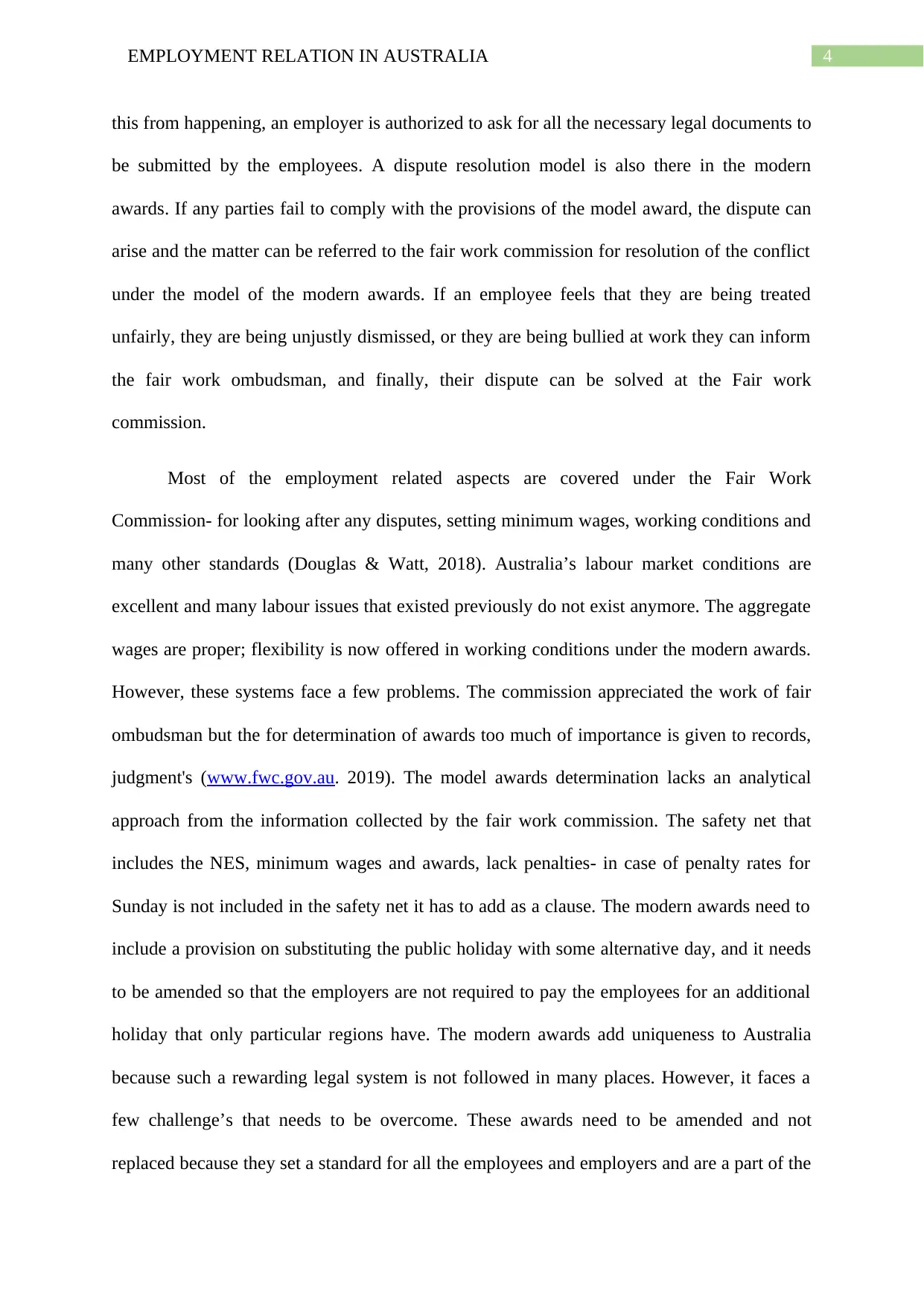
4EMPLOYMENT RELATION IN AUSTRALIA
this from happening, an employer is authorized to ask for all the necessary legal documents to
be submitted by the employees. A dispute resolution model is also there in the modern
awards. If any parties fail to comply with the provisions of the model award, the dispute can
arise and the matter can be referred to the fair work commission for resolution of the conflict
under the model of the modern awards. If an employee feels that they are being treated
unfairly, they are being unjustly dismissed, or they are being bullied at work they can inform
the fair work ombudsman, and finally, their dispute can be solved at the Fair work
commission.
Most of the employment related aspects are covered under the Fair Work
Commission- for looking after any disputes, setting minimum wages, working conditions and
many other standards (Douglas & Watt, 2018). Australia’s labour market conditions are
excellent and many labour issues that existed previously do not exist anymore. The aggregate
wages are proper; flexibility is now offered in working conditions under the modern awards.
However, these systems face a few problems. The commission appreciated the work of fair
ombudsman but the for determination of awards too much of importance is given to records,
judgment's (www.fwc.gov.au. 2019). The model awards determination lacks an analytical
approach from the information collected by the fair work commission. The safety net that
includes the NES, minimum wages and awards, lack penalties- in case of penalty rates for
Sunday is not included in the safety net it has to add as a clause. The modern awards need to
include a provision on substituting the public holiday with some alternative day, and it needs
to be amended so that the employers are not required to pay the employees for an additional
holiday that only particular regions have. The modern awards add uniqueness to Australia
because such a rewarding legal system is not followed in many places. However, it faces a
few challenge’s that needs to be overcome. These awards need to be amended and not
replaced because they set a standard for all the employees and employers and are a part of the
this from happening, an employer is authorized to ask for all the necessary legal documents to
be submitted by the employees. A dispute resolution model is also there in the modern
awards. If any parties fail to comply with the provisions of the model award, the dispute can
arise and the matter can be referred to the fair work commission for resolution of the conflict
under the model of the modern awards. If an employee feels that they are being treated
unfairly, they are being unjustly dismissed, or they are being bullied at work they can inform
the fair work ombudsman, and finally, their dispute can be solved at the Fair work
commission.
Most of the employment related aspects are covered under the Fair Work
Commission- for looking after any disputes, setting minimum wages, working conditions and
many other standards (Douglas & Watt, 2018). Australia’s labour market conditions are
excellent and many labour issues that existed previously do not exist anymore. The aggregate
wages are proper; flexibility is now offered in working conditions under the modern awards.
However, these systems face a few problems. The commission appreciated the work of fair
ombudsman but the for determination of awards too much of importance is given to records,
judgment's (www.fwc.gov.au. 2019). The model awards determination lacks an analytical
approach from the information collected by the fair work commission. The safety net that
includes the NES, minimum wages and awards, lack penalties- in case of penalty rates for
Sunday is not included in the safety net it has to add as a clause. The modern awards need to
include a provision on substituting the public holiday with some alternative day, and it needs
to be amended so that the employers are not required to pay the employees for an additional
holiday that only particular regions have. The modern awards add uniqueness to Australia
because such a rewarding legal system is not followed in many places. However, it faces a
few challenge’s that needs to be overcome. These awards need to be amended and not
replaced because they set a standard for all the employees and employers and are a part of the
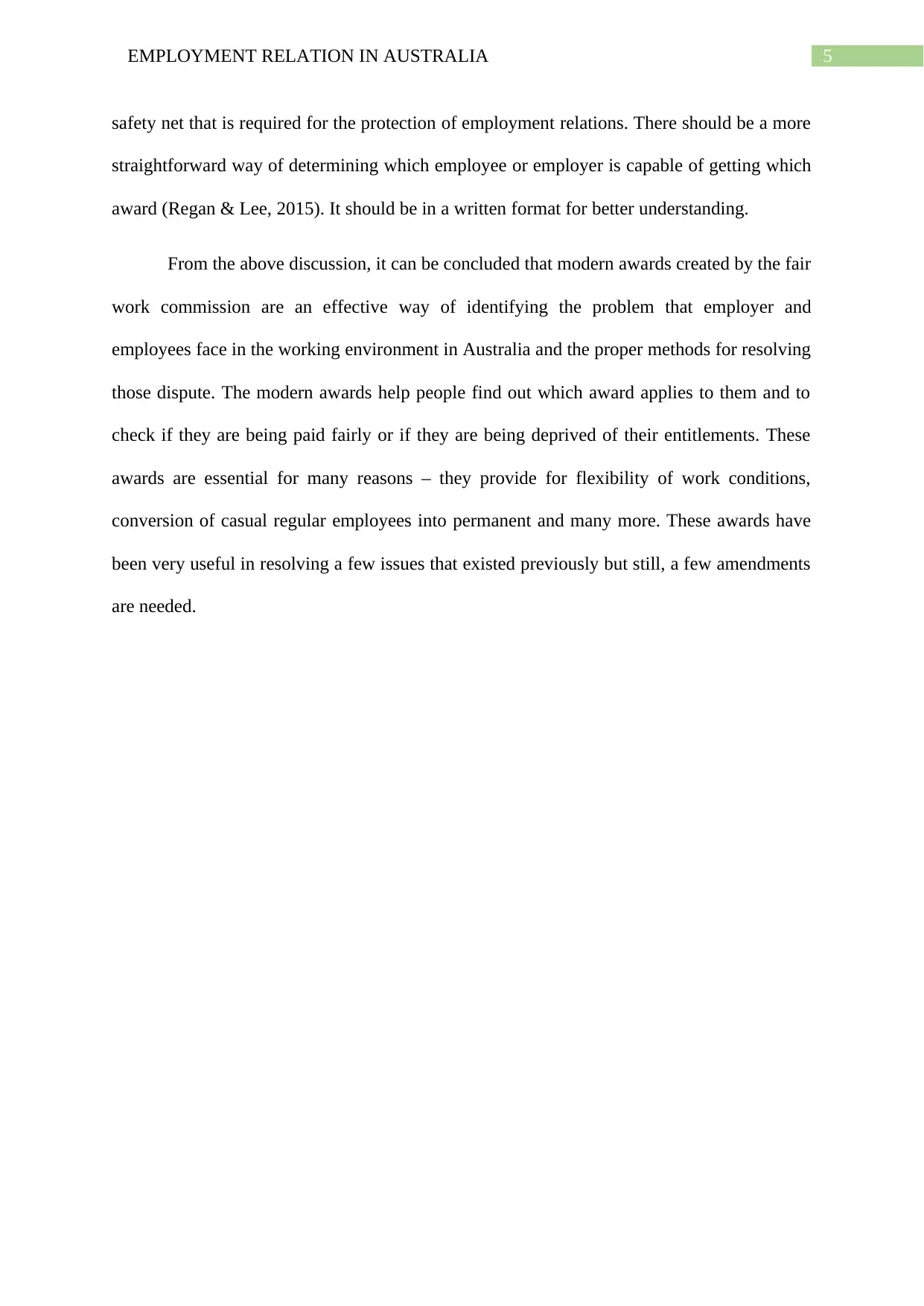
5EMPLOYMENT RELATION IN AUSTRALIA
safety net that is required for the protection of employment relations. There should be a more
straightforward way of determining which employee or employer is capable of getting which
award (Regan & Lee, 2015). It should be in a written format for better understanding.
From the above discussion, it can be concluded that modern awards created by the fair
work commission are an effective way of identifying the problem that employer and
employees face in the working environment in Australia and the proper methods for resolving
those dispute. The modern awards help people find out which award applies to them and to
check if they are being paid fairly or if they are being deprived of their entitlements. These
awards are essential for many reasons – they provide for flexibility of work conditions,
conversion of casual regular employees into permanent and many more. These awards have
been very useful in resolving a few issues that existed previously but still, a few amendments
are needed.
safety net that is required for the protection of employment relations. There should be a more
straightforward way of determining which employee or employer is capable of getting which
award (Regan & Lee, 2015). It should be in a written format for better understanding.
From the above discussion, it can be concluded that modern awards created by the fair
work commission are an effective way of identifying the problem that employer and
employees face in the working environment in Australia and the proper methods for resolving
those dispute. The modern awards help people find out which award applies to them and to
check if they are being paid fairly or if they are being deprived of their entitlements. These
awards are essential for many reasons – they provide for flexibility of work conditions,
conversion of casual regular employees into permanent and many more. These awards have
been very useful in resolving a few issues that existed previously but still, a few amendments
are needed.
⊘ This is a preview!⊘
Do you want full access?
Subscribe today to unlock all pages.

Trusted by 1+ million students worldwide
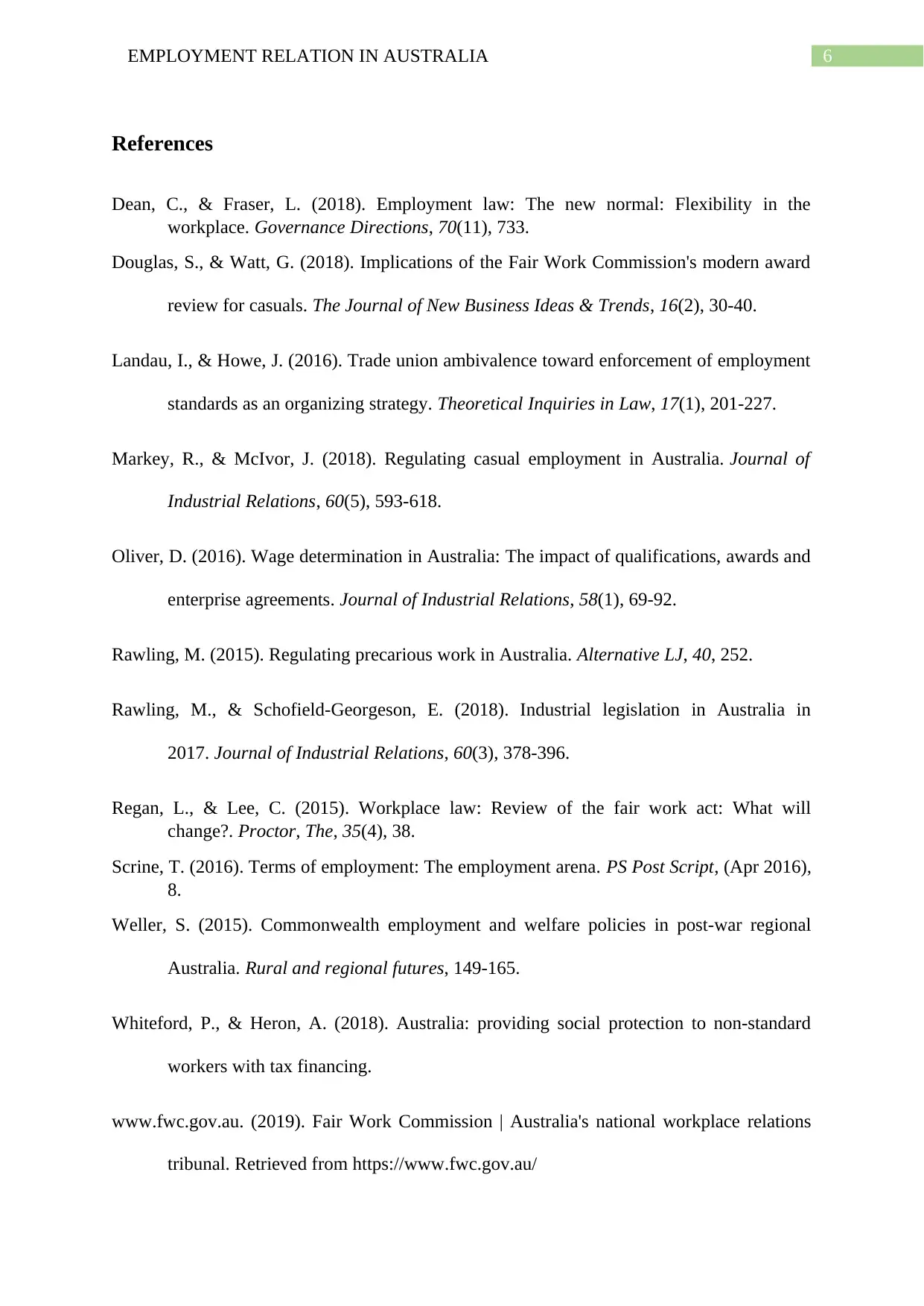
6EMPLOYMENT RELATION IN AUSTRALIA
References
Dean, C., & Fraser, L. (2018). Employment law: The new normal: Flexibility in the
workplace. Governance Directions, 70(11), 733.
Douglas, S., & Watt, G. (2018). Implications of the Fair Work Commission's modern award
review for casuals. The Journal of New Business Ideas & Trends, 16(2), 30-40.
Landau, I., & Howe, J. (2016). Trade union ambivalence toward enforcement of employment
standards as an organizing strategy. Theoretical Inquiries in Law, 17(1), 201-227.
Markey, R., & McIvor, J. (2018). Regulating casual employment in Australia. Journal of
Industrial Relations, 60(5), 593-618.
Oliver, D. (2016). Wage determination in Australia: The impact of qualifications, awards and
enterprise agreements. Journal of Industrial Relations, 58(1), 69-92.
Rawling, M. (2015). Regulating precarious work in Australia. Alternative LJ, 40, 252.
Rawling, M., & Schofield-Georgeson, E. (2018). Industrial legislation in Australia in
2017. Journal of Industrial Relations, 60(3), 378-396.
Regan, L., & Lee, C. (2015). Workplace law: Review of the fair work act: What will
change?. Proctor, The, 35(4), 38.
Scrine, T. (2016). Terms of employment: The employment arena. PS Post Script, (Apr 2016),
8.
Weller, S. (2015). Commonwealth employment and welfare policies in post-war regional
Australia. Rural and regional futures, 149-165.
Whiteford, P., & Heron, A. (2018). Australia: providing social protection to non-standard
workers with tax financing.
www.fwc.gov.au. (2019). Fair Work Commission | Australia's national workplace relations
tribunal. Retrieved from https://www.fwc.gov.au/
References
Dean, C., & Fraser, L. (2018). Employment law: The new normal: Flexibility in the
workplace. Governance Directions, 70(11), 733.
Douglas, S., & Watt, G. (2018). Implications of the Fair Work Commission's modern award
review for casuals. The Journal of New Business Ideas & Trends, 16(2), 30-40.
Landau, I., & Howe, J. (2016). Trade union ambivalence toward enforcement of employment
standards as an organizing strategy. Theoretical Inquiries in Law, 17(1), 201-227.
Markey, R., & McIvor, J. (2018). Regulating casual employment in Australia. Journal of
Industrial Relations, 60(5), 593-618.
Oliver, D. (2016). Wage determination in Australia: The impact of qualifications, awards and
enterprise agreements. Journal of Industrial Relations, 58(1), 69-92.
Rawling, M. (2015). Regulating precarious work in Australia. Alternative LJ, 40, 252.
Rawling, M., & Schofield-Georgeson, E. (2018). Industrial legislation in Australia in
2017. Journal of Industrial Relations, 60(3), 378-396.
Regan, L., & Lee, C. (2015). Workplace law: Review of the fair work act: What will
change?. Proctor, The, 35(4), 38.
Scrine, T. (2016). Terms of employment: The employment arena. PS Post Script, (Apr 2016),
8.
Weller, S. (2015). Commonwealth employment and welfare policies in post-war regional
Australia. Rural and regional futures, 149-165.
Whiteford, P., & Heron, A. (2018). Australia: providing social protection to non-standard
workers with tax financing.
www.fwc.gov.au. (2019). Fair Work Commission | Australia's national workplace relations
tribunal. Retrieved from https://www.fwc.gov.au/
1 out of 7
Related Documents
Your All-in-One AI-Powered Toolkit for Academic Success.
+13062052269
info@desklib.com
Available 24*7 on WhatsApp / Email
![[object Object]](/_next/static/media/star-bottom.7253800d.svg)
Unlock your academic potential
Copyright © 2020–2026 A2Z Services. All Rights Reserved. Developed and managed by ZUCOL.




